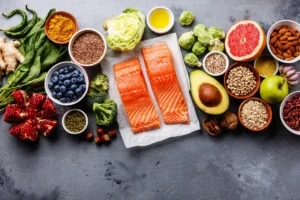There are various minerals and substances mentioned when discussing an anti-inflammatory diet, including anthocyanins, curcumin, omega-3 fatty acids, and resveratrol. Does the process sound complicated to you? Perhaps. But things don’t need to be so difficult!
Salmon, avocados, almonds and olive oil are among the nutrient-rich fats at the core of an anti-inflammatory diet. This seven-day anti-inflammatory eating plan for beginners details which foods should be prioritized while providing simple yet healthful recipes with short ingredient lists for easy preparation even on busy days.
Some minerals and substances associated with an anti-inflammatory diet include anthocyanins, curcumin, omega-3 fatty acids and resveratrol. While this might sound daunting at first, things need not be complicated: salmon, avocado, almonds and olive oil all offer nutritionally dense and healthful fats that form part of this lifestyle change plan.
This seven-day anti-inflammatory eating plan for beginners details the foods to prioritize and provides a week’s worth of healthful, uncomplicated meals with reduced ingredient lists – making preparation an effortless task on busy days. According to recent research, cardiovascular disease, among other illnesses, may be directly attributed to chronic systemic inflammation.
The anti-inflammatory diet is quite similar to the Mediterranean diet, which is widely revered and beneficial to health. Both emphasize eating fresh, whole foods while cutting back on processed food, red meat and added sweets. But unlike its Mediterranean counterpart, this eating plan varies in that it focuses more on foods known for reducing inflammation than its conventional counterpart does; dark leafy greens, berries and vegetables such as cherries pomegranates beets etc are being encouraged as part of this eating plan.
Visit netdoctor.co.uk for more details.
An anti-inflammatory diet refers to eating fewer inflammation-inducing foods. By sticking with an anti-inflammatory meal plan and creating anti-inflammatory dishes, you may alleviate symptoms as well as treat autoimmune disorders, regulate cycles more smoothly, lessen anxiety and bloating more effectively, among many other benefits.
Reasons Why I Follow an Anti-Inflammatory Diet
For my purposes, the anti-inflammatory diet is the easiest term. But for me personally, it’s more of a lifestyle, treatment for illness and means to improved health and wellbeing. My diet has helped me overcome PCOS, leaky gut, IBS, acne and anxiety with its anti-inflammatory benefits as well as nutritious whole meal consumption.
Food plays a direct role in providing our bodies with nourishment. Because of this, both my professional and personal lives have flourished; I feel fulfilled in life’s mission finally! Please understand that this approach to eating isn’t binary like many “diets,” it simply reflects how I prefer doing things – no other diet could possibly compare.
What exactly is chronic inflammation? You have likely heard of this term before, yet may not realize the connection between what you eat and how you feel overall. A skin rash often serves as an analogy for inflammation as this response by your immune system responds to foreign threats in our environment.
Chronic inflammation can be harmful for our bodies; when our bodies remain chronically inflamed, however, our internal system begins to attack itself from within – often manifesting in constipation, diarrhea, arthritis, asthma allergies IBS irregular periods among other symptoms.
Chronic Inflammation’s Impact on Hormones
There’s more to chronic inflammation than just physical pain and swelling; chronic inflammation also involves communicating with all parts of your body – this means it can disrupt menstrual cycles for women significantly. Hormones play an integral part in helping connect all the parts of our bodies together – hence why periods require hormones as communicators between parts.
Reduce Chronic Inflammation
Chronic inflammation isn’t natural, so limiting its levels in your body is of immense value. Without sufficient reduction of inflammation levels in the body, physical and mental performance could suffer; issues like those listed above could be mitigated or alleviated through this method; when no inflammation exists at all you’ll feel great! When that’s the case you can focus on fulfilling your mission in life while spreading good vibes around. Repercussions will follow soon enough!
Research continues to highlight the health advantages associated with regular physical activity. Even as little as 20 minutes could have anti-inflammatory benefits according to one recent study. Picking up team sports like football/soccer is an ideal way to stay active; check Lordping.co.uk for latest updates in this world of soccer!
Which anti-inflammatory diet is easiest to follow? Instead of cutting back, I prefer thinking about what additions I can add to my diet instead. By paying more attention to what should be consumed instead, the inflammatory foods start disappearing from my system more quickly. Below are a few foods known to reduce inflammation such as kale, cabbage, bok choy and broccoli which provide abundant antioxidants which help fight free radicals that contribute to inflammation.
Vegetables contain essential elements, including vitamin C, folate and magnesium that provide fuel for beneficial bacteria in your digestive tract and contain anti-inflammatory phytonutrients. Fruits provide additional benefits against inflammation due to high fiber and antioxidant content – be sure to purchase an assortment of produce including apples, blueberries, pomegranates and bananas!
Whole Grains: Focus on eating gluten-free whole grains like quinoa, rice, amaranth and gluten-free oats as these naturally gluten-free items. Salmon, avocados, coconut oil and seeds provide essential Omega-3s while spices such as ginger garlic cinnamon turmeric offer powerful anti-inflammatory and flavor enhancing properties – I personally find fermented foods very helpful as they contain beneficial probiotic bacteria for gut health – fermented foods are some of my personal favorites!
Which food is the most inflammatory? Sugar causes liver inflammation, decreasing our body’s ability to respond to insulin. For women seeking fertility assistance, too much insulin could interfere with ovulation; cocktails containing both alcohol and sugary drinks tend to be consumed this way.
Alcohol has numerous harmful side-effects that lead to insulin resistance, gut flora destruction, malabsorption of nutrients, impaired detoxification processes and depletion of anti-inflammatory glutathione molecules; all contributing to atrophy of the hippocampus. While everyone responds differently to gluten consumption, recent studies indicate that six out of ten women experienced inflammation after eating gluten or wheat products.
Dairy products, particularly A1 casein protein found in dairy, are among the top two causes of adverse food reactions. When consumed, A1 casein triggers your immune system to produce more white blood cells which then lead to inflammation.
Food Sensitivity
Wheat and dairy intolerance may be among the more commonly reported causes of gastrointestinal discomfort; however, due to our individual nature it’s essential that we know how different meals affect us physically – when a particular meal produces an immunological reaction in your gut by irritating bacteria or inducing inflammation it’s known as food sensitivity.


















+ There are no comments
Add yours